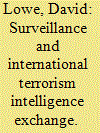| Srl | Item |
| 1 |
ID:
188086


|
|
|
|
|
| Summary/Abstract |
Following the rise in far-right inspired terrorist attacks globally, social media and electronic communications companies have been criticized, mainly by politicians, for allowing far-right extremist content to be available. This article is a comparative legal study focusing on Australia, Canada, New Zealand, the U.K., and the U.S.’ legal provisions regarding the right to freedom of expression, hate crime, and proscription of terrorist organizations. This study found a disparity in the form of expression protected under this right. This disparity widens further when related to hate crime and proscribing groups as terrorist organizations. As such, social media and communications companies have difficulty setting at global level a baseline in determining whether content is legitimate commentary or is extremism promoting or inciting hatred and violence. The article concludes with a recommendation for how states can provide comparable legislation on hate crime as they have done in relation to Islamist inspired extremism. This will assist social media and communications companies in removing content and suspending accounts. These companies are not the guardians of freedom of expression, that is the role of states’ legislatures and judiciary.
|
|
|
|
|
|
|
|
|
|
|
|
|
|
|
|
| 2 |
ID:
156617


|
|
|
|
|
| Summary/Abstract |
As the United Kingdom has placed some of its Prevent strategy on a statutory footing and is proposing to introduce a Counter-Extremism Bill, this article argues that a legal definition of extremism must be carefully drafted to provide legal certainty. The main recommendation is that all forms of violent and nonviolent extremism comes under the definition, ensuring it is differentiated from activism. Activism may hold radical views counter to the mainstream opinion, but it is required in liberal democracies as it encourages healthy debate and can prevent the policing of thought in any government strategy or legislation.
|
|
|
|
|
|
|
|
|
|
|
|
|
|
|
|
| 3 |
ID:
148921


|
|
|
|
|
| Summary/Abstract |
Using the revelations Edward Snowden passed over to the press regarding the actions of the U.S.’s National Security Agency and the UK’s Government Communications Headquarters and their use of the Prism project, this article examines the law surrounding intelligence gathering in the U.S. and UK. Underpinning the analysis is the legal principle of proportionality as applied to balancing the interests of national security and individual liberties. After examining intelligence exchange procedures, which for the UK is through negotiated agreements between national security agencies and through the European Union’s policing agency, Europol, the main part of the article discusses legal challenges that have been made regarding surveillance and the use of anti-terror laws on citizens and the rationale behind the judicial decisions made in both the U.S. and UK jurisdictions. The argument forwarded is that there is a requirement for wide preventative powers being granted to counter-terrorism agencies and that the interests of national security and individual liberty are inclusive and, as shown by the cases covered in this article, we should rely on the judiciary to perform their function in applying proportionality to each case on its own merits.
|
|
|
|
|
|
|
|
|
|
|
|
|
|
|
|